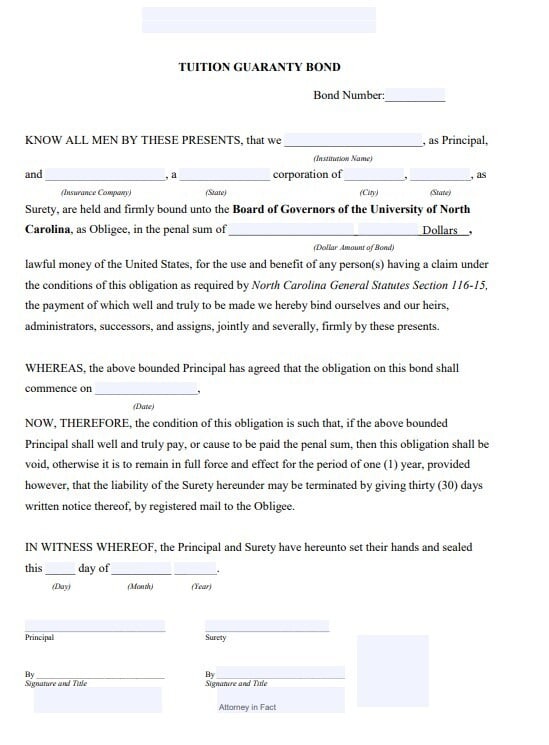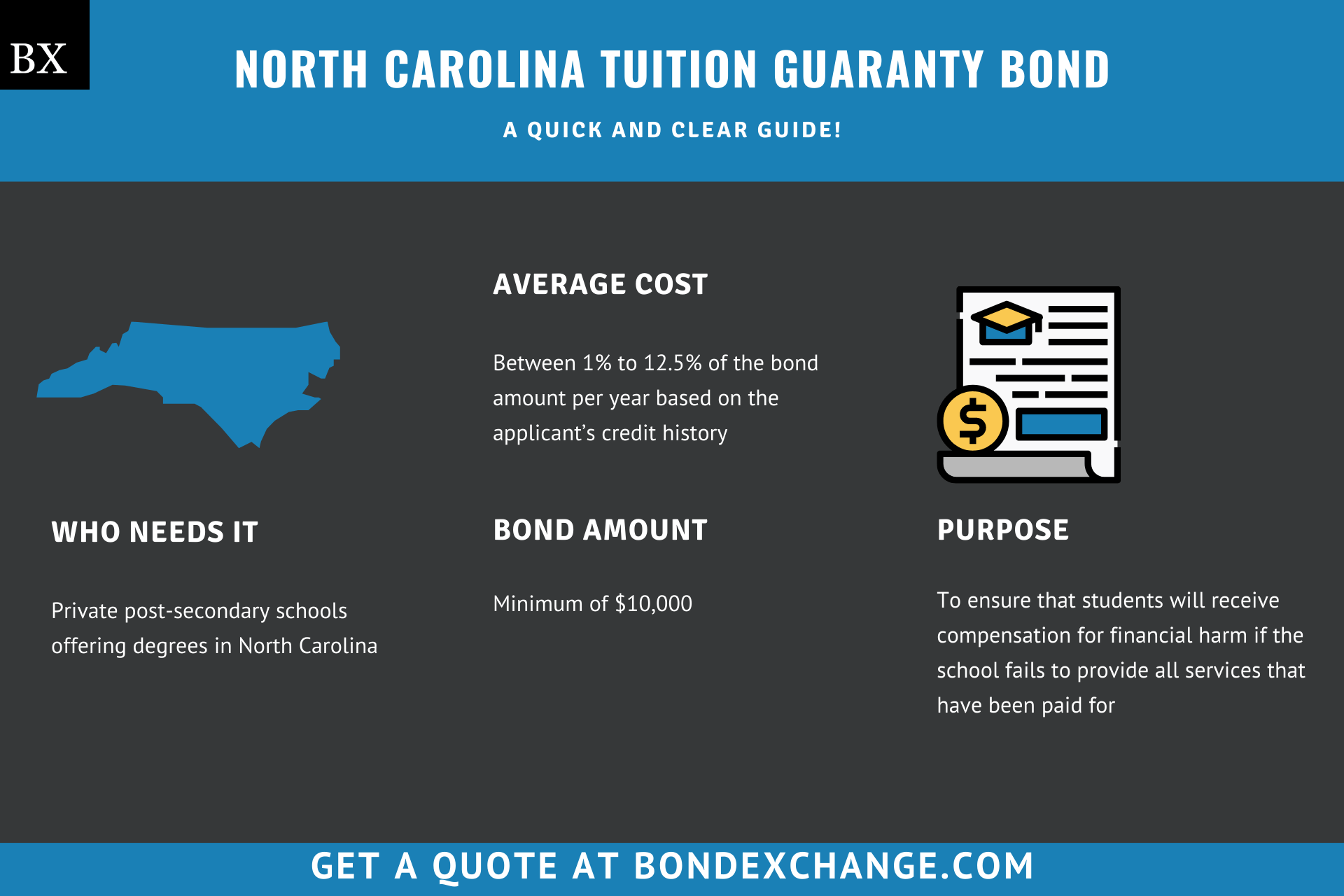North Carolina Tuition Guaranty Bond: A Comprehensive Guide
This guide provides information for insurance agents to help their customers obtain a North Carolina Tuition Guaranty bond
At a Glance:
- Lowest Cost: $100 per year or $10 per month
- Bond Amount: Minimum of $10,000 (more on this later)
- Who Needs it: Private post-secondary schools offering degrees in North Carolina
- Purpose: To ensure that students will receive compensation for financial harm if the school fails to provide all services that have been paid for
- Who Regulates Post-Secondary Schools in North Carolina: The North Carolina Board of Governors

Background
North Carolina Statute 116-15 requires private post-secondary schools offering degrees to obtain a license from the Board of Governors. The North Carolina legislature enacted the licensing requirement to ensure that post-secondary schools engage in ethical business practices and are qualified to provide instruction. To provide financial security for the enforcement of the licensing law, private post-secondary schools offering degrees must purchase and maintain a surety bond to be eligible for licensure.
What is the Purpose of the North Carolina Tuition Guaranty Bond?
North Carolina requires private post-secondary schools offering degrees to purchase a surety bond as part of the application process to obtain a license. The bond ensures that students will receive compensation for financial harm if the school fails to comply with the regulations outlined in North Carolina Statute 116-15. Specifically, the bond protects students if the school ceases operations and fails to provide refunds for services that have been paid for but not received. In short, the bond is a type of insurance that protects students if the school violates the terms of its license.
How Can an Insurance Agent Obtain a North Carolina Tuition Guaranty Surety Bond?
BondExchange makes obtaining a North Carolina Tuition Guaranty bond easy. Simply login to your account and use our keyword search to find the “Tuition” bond in our database. Don’t have a login? Gain access now and let us help you satisfy your customers’ needs. Our friendly underwriting staff is available by phone (800) 438-1162, email or chat from 7:30 AM to 7:00 PM EST to assist you.
At BondExchange, our 40 years of experience, leading technology, and access to markets ensures that we have the knowledge and resources to provide your clients with fast and friendly service whether obtaining quotes or issuing bonds.
Not an agent? Then let us pair you with one!

Click the above image to find a BX Agent near you
How is the Bond Amount Determined?
North Carolina Statute 116-15 dictates that the bond amount must be equal to the maximum amount of prepaid tuition held by the school at any point during the last fiscal year. However, the bond must be a minimum of $10,000.
Is a Credit Check Required for the North Carolina Tuition Guaranty Bond?
Surety companies will run a credit check on the owners of the school to determine eligibility and pricing for the North Carolina Tuition Guaranty bond. Owners with excellent credit and work experience can expect to receive the best rates. Owners with poor credit may be declined by some surety companies or pay higher rates. The credit check is a “soft hit,” meaning that the credit check will not affect the owner’s credit.
How Much Does the North Carolina Tuition Guaranty Bond Cost?
The North Carolina Tuition Guaranty bond can cost anywhere between 1% to 12.5% of the bond amount per year. Insurance companies determine the rate based on several factors including your customer’s credit score and experience. The chart below offers a quick reference for the cost of a $10,000 bond requirement.
$10,000 Tuition Guaranty Bond Cost
| Credit Score | Bond Cost (1 year) | Bond Cost (1 month) |
|---|---|---|
| 720+ | $100 | $10 |
| 680 – 719 | $150 | $15 |
| 650 – 679 | $200 | $20 |
| 600 – 649 | $400 | $40 |
| 550 – 599 | $750 | $75 |
| 500 – 549 | $1,250 | $125 |
*The credit score ranges do not include other factors that may result in a change to the annual premium offered to your customers, including but not limited to, years of experience and underlying credit factors contained within the business owner’s credit report.
BondExchange now offers monthly pay-as-you-go subscriptions for surety bonds. Your customers are able to purchase their bonds on a monthly basis and cancel them anytime. Learn more here.
Who is Required to Purchase the Bond?
North Carolina requires private post-secondary schools offering degrees to purchase a surety bond as a prerequisite to obtaining a license. North Carolina Statute 116-15 requires all schools that do any of the following activities to obtain a license:
- Award post-secondary degrees
- Conduct courses, provide experience and/or testing, or certify past courses, experience, or testing while promising that individuals who complete their program will be awarded a post-secondary degree or at least part of one
The following types of post-secondary schools are exempt from the bonding and licensing requirements:
- Schools conducting post-secondary degree activities pursuant to the United State Authorization and Reciprocity Agreement (SARA)
- Schools only conducting post-secondary degree activity on military reservations for active personnel
- Schools offering religious vocational training
- Schools that have been continuously conducting post-secondary degree activity in North Carolina since 1971
How do North Carolina Private Post-Secondary Schools Apply for a License?
Private post-secondary schools in North Carolina must navigate several steps to obtain a license. Below are the general guidelines, but applicants should refer to the UNC System’s licensing page for details on the process.
License Period – All North Carolina Private Post-Secondary School Licenses expire in September of each year and must be renewed before the expiration date
Step 1 – Meet the Required Standards
To be eligible for licensure, post-secondary schools must meet all of the following standards:
-
- Be state-chartered or hold a valid Certificate of Authority
- Have conducted post-secondary degree activities for at least two years
- *Schools that do not meet this requirement may receive an interim permit and will be issued their full license after operating for two years
- Each course must fulfill its stated purpose
- Have adequate facilities, including a library
- All directors, supervisors, administrators, and conductors must be qualified
- Provide current and prospective students with a catalog listing all courses, tuition, fees, etc.
- Provide students that have completed a program with the proper credentials
- Maintain all required student records
- Provide all required student services
- Comply with all applicable laws and ordinances
- Be financially sound and capable of fulfilling all student commitments
- Do not engage in fraudulent business practices
- Ensure all directors, administrators, officers, instructors, and institutions/agencies the school contracts with do not have a record of unprofessional conduct
- Ensure all student housing is safe and adequate
- Have a fair and equitable cancellation and refund policy
For more information regarding the required standards, check out the board’s Policy on Standards for Licensure.
Step 2 – Contact the State Authorization Unit
Schools that meet the above standards must contact the board’s State Authorization Unity to apply for licensure. The unit will schedule a preliminary conference with the applicant where they will walk the applicant through the application process, provide them with all required application forms, and answer any questions they may have.
Step 3 – Purchase a Surety Bond
Private post-secondary schools that offer degrees must purchase and maintain a surety bond in an amount determined by the State Authorization Unit (limits outlined above). The unit will inform the school of the required bond amount during the preliminary conference.
How do North Carolina Private Postsecondary Schools Renew Their Licenses?
Before the expiration date, the State Authorization Unit will email the school instructions on how to renew their license. All North Carolina Private Post-Secondary School Licenses expire in September of each year and must be renewed before the expiration date.
What are the Insurance Requirements for North Carolina Private Post-Secondary Schools?
North Carolina does not require private postsecondary schools to purchase any form of liability insurance as a prerequisite to obtaining a state license. However, schools may need to purchase insurance before receiving a local business or tax license. Private post-secondary schools offering degree services must purchase and maintain a surety bond (limits outlined above).
How Do North Carolina Private Post-Secondary Schools File Their Bonds?
Private post-secondary schools should submit their completed bond forms, including the power of attorney, to the State Authorization Unit at the following address:
State Authorization Unit
140 Friday Center Drive
Chapel Hill, NC 27517
The surety bond requires signatures from both the surety company that issues the bond and the applicant. The surety company should include the following information on the bond form:
- Legal name of the entity/individual(s) buying the bond
- Surety company’s name, city, and state
- Bond amount
- Date the bond goes into effect
- Date the bond is signed
What Can North Carolina Private Post-Secondary Schools do to Avoid Claims Made Against Their Bonds?
To avoid claims against their bonds, private post-secondary schools offering degree services in North Carolina must ensure that they issue refunds for all services that have been paid for but not received.
What Other Insurance Products Can Agents Offer North Carolina Private Post-Secondary Schools?
Most reputable private post-secondary schools will purchase liability insurance. Bonds are our only business at BondExchange, so we do not issue any other types of insurance, but our agents often utilize brokers for this specific line of business. A list of brokers in this space can be found here.
How Can Insurance Agents Prospect for North Carolina Private Post-Secondary School Customers?
North Carolina conveniently provides a public database of active private post-secondary schools offering degree services in the state. Contact BondExchange for additional marketing resources. Agents can also leverage our print-mail relationships for discounted mailing services.

